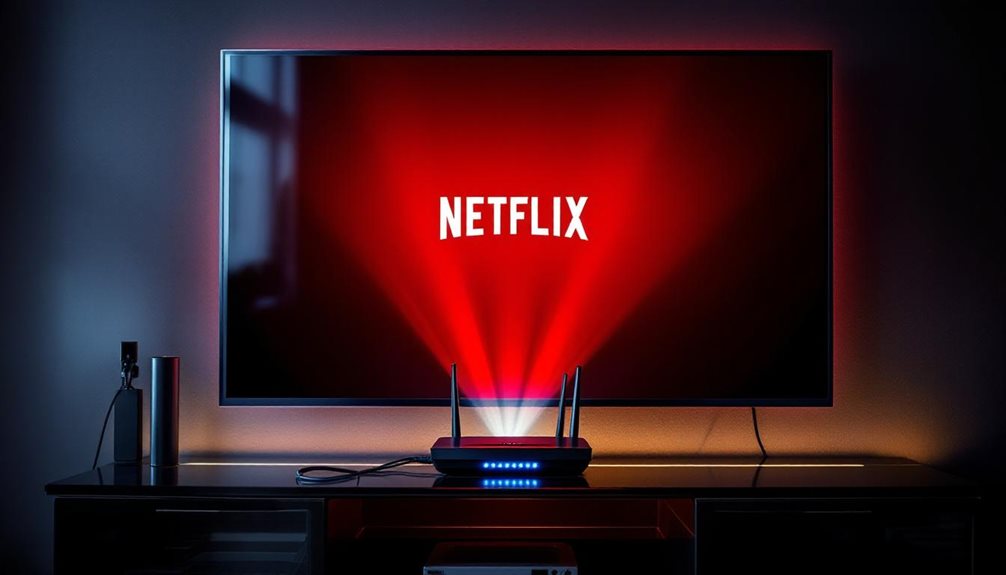Netflix streaming needs vary from 3 Mbps for basic HD to 25 Mbps for comfortable 4K viewing. Most households require more bandwidth than expected since multiple devices compete for connection—smartphones, tablets, smart TVs, and gaming consoles all drain speed. A family streaming different programmes simultaneously whilst someone video calls needs at least 50-75 Mbps. Factor in network stability and peak usage times when choosing plans. The right broadband choice depends on specific household habits and future needs.
Essential Internet Speeds for Different Netflix Streaming Qualities
Picture settling in for a Netflix binge only to face the dreaded buffering wheel spinning endlessly on screen. Nobody wants that nightmare scenario ruining their Friday night plans.
Netflix’s official guidelines spell out the basics: HD streaming needs just 3 Mbps for 720p quality, whilst Full HD bumps that requirement to 5 Mbps. Those craving crystal-clear 4K content better have at least 15 Mbps flowing through their connection.
These numbers assume single-device usage though – real life gets messier. Most South African households juggle multiple screens, smart devices, and someone inevitably scrolling social media. When streaming on multiple devices simultaneously, your speed requirements increase substantially. Network stability plays just as crucial a role as raw speed, since an unstable connection causes buffering issues even with adequate bandwidth.
That’s why experts recommend beefier speeds: 25 Mbps for comfortable HD viewing when accounting for typical internet multitasking. Modern uncapped broadband solutions eliminate data concerns whilst providing the consistent speeds needed for seamless streaming experiences.
The takeaway? Netflix’s minimum speeds work in perfect conditions, but realistic streaming demands more bandwidth, especially considering South Africa’s variable network conditions. Tailored solutions from experienced providers can help ensure your connection meets both current streaming needs and future household demands.
Calculating Your Household’s Total Bandwidth Requirements
Calculating Your Household’s Total Bandwidth Requirements
Knowing Netflix’s speed requirements marks just the starting point for households needing reliable streaming. A family must count every connected device – smartphones, tablets, laptops, and smart TVs – then multiply by their individual bandwidth needs.
During prime evening hours, Mum might stream 4K content (25 Mbps) whilst Dad joins a video conference (5 Mbps upload) and the kids game online (another 25 Mbps). That’s already 55 Mbps without counting smart thermostats or security cameras quietly consuming bandwidth in the background. Modern security cameras vary significantly in their bandwidth consumption, with high-resolution models demanding more than basic units.
The maths gets trickier with overlapping usage. Two simultaneous 4K streams demand 50 Mbps alone. Smart households add a 20-30% buffer for network congestion and load shedding-related connectivity issues.
Online bandwidth calculators simplify this process, but manually adding up device requirements often reveals surprising totals that explain why streams buffer during family film night. These tools help users optimise internet performance by providing clear measurements of both download and upload requirements for their specific household needs. Businesses with similar connectivity needs can benefit from uncapped broadband options that provide consistent speeds without data limitations. High-quality voice over broadband technology can further enhance home communication systems whilst sharing the same internet connection.
Selecting the Right Electrocom Broadband Plan for Your Streaming Needs
How exactly does someone choose the right internet plan when every provider seems to promise “blazing fast speeds” and “perfect streaming? The answer lies in matching actual needs to specific plan features.
For basic Netflix viewing, Silver plans at 150 Mbps handle HD streaming perfectly. Families juggling multiple devices should consider Gold plans at 300 Mbps, whilst 4K enthusiasts need Gold Plus’s 500 Mbps minimum. The most robust option delivers 2 Gig speeds with 2137.32 Mbps typical download performance for households demanding ultimate connectivity.
The real breakthrough? Symmetrical speeds for households with remote workers or gamers. Plans like Platinum Plus deliver identical upload and download speeds at 1 Gbps.
Budget-conscious streamers can start with Bronze plans, though jumping to mid-tier Gold eliminates buffering headaches.
South African households should also consider loadshedding backup options and factor in included equipment and managed Wi-Fi features that simplify setup during power outages.
